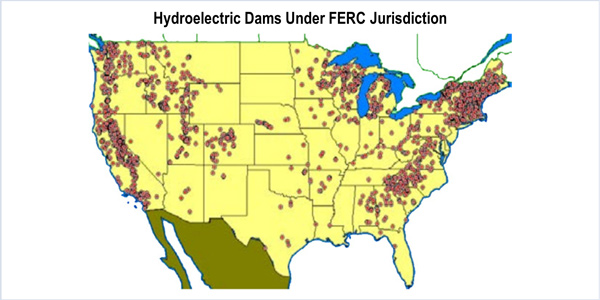By Rich Heidorn Jr.
WASHINGTON — FERC on Thursday set a 40-year default term for hydropower licenses, a move it said will reduce administrative costs and encourage dam owners to upgrade capacity and make environmental or recreational investments.
“This is quite a big deal, because we’re changing a policy we’ve had in place for several decades,” said Commissioner Cheryl LaFleur.
The commission’s policy statement (PL17-3), which will apply to original licenses and license renewals, also set conditions under which it will consider terms longer or shorter than 40 years:
- If necessary to coordinate license terms for projects located within the same river basin;
- When a different term is included in a “generally supported” and “comprehensive” settlement agreement that does not conflict with terms for projects in the same river basin; and
- When an applicant requests a longer term based on “significant measures” voluntarily implemented during the prior license term or expected to be required for renewal. The commission has previously found that the construction of pumped storage facilities, fish passage facilities, fish hatcheries, recreation facilities, dams and powerhouses warranted longer license terms.
FERC regulates more than 2,500 dams with 55,800 MW of capacity, more than half of all hydroelectric capacity in the U.S. The Federal Power Act allows the commission to issue original licenses for up to 50 years and renewals for between 30 and 50 years. There is no minimum license term for original licenses.
The commission’s policy on renewals had been to set a 30-year term when there is little or no new construction or environmental mitigation required; a 40-year term for projects with a “moderate” amount of such activities; and a 50-year term for projects requiring “an extensive” amount of such activity.
The change resulted from the commission’s November 2016 Notice of Inquiry, which followed licensees’ complaints that the commission should consider longer license terms to recognize settlement agreements, prior investments, relicensing costs and losses in generation value resulting from environmental measures. (See FERC Considers Change to Hydro License Rules.)
The NOI generated more than 40 responses, most of which supported policy changes. Some complained that license applicants lack guidance on what measures will yield longer license terms. Others said that because the commission’s policy is forward-looking, licensees delay seeking approval for capacity upgrades and environmental and recreational enhancements until they apply for a new license.
Some industry commenters complained that the license term cannot be used as a “bargaining chip” in settlement talks because the commission might reject that term; they also said the current policy penalizes well-maintained and low-impact projects that don’t require substantial new investments and thus only receive a 30-year license.
Compromise
The 40-year default represents a compromise between industry stakeholders — who generally supported a 50-year default — and environmental groups and most federal and state resource agencies, who said making the default equal to the FPA’s maximum would eliminate incentives for applicants to agree to mitigation measures.
“The resource agencies also contend that such policy would result in applicants focusing their license application study efforts on disproving project effects rather than on identifying potential mitigation measures,” the commission said.
FERC staff expects more than 300 relicensing requests through 2025, which would have required case-by-case analyses under the current rules.
The commission said the change will provide licensees and other stakeholders with more certainty while reducing administrative burdens. Case-specific assessments will only be required for licensees seeking a term longer than 40 years that is not subject to a settlement agreement.
The new rules will apply to all licenses issued following publication of the policy statement in the Federal Register. Those with pending license applications can file petitions demonstrating why the commission should grant a term longer than 40 years or settlement agreements that include longer terms. “The commission, however, will not entertain applications to amend existing licenses to extend their license terms simply on the basis of this new license term policy,” FERC said.





